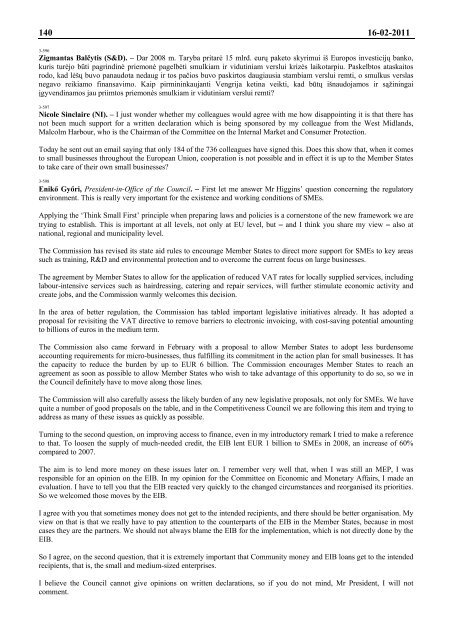XL - Eiropas Parlaments - Europa
XL - Eiropas Parlaments - Europa
XL - Eiropas Parlaments - Europa
Create successful ePaper yourself
Turn your PDF publications into a flip-book with our unique Google optimized e-Paper software.
140 16-02-2011<br />
3-596<br />
Zigmantas Balčytis (S&D). – Dar 2008 m. Taryba pritarė 15 mlrd. eurų paketo skyrimui iš Europos investicijų banko,<br />
kuris turėjo būti pagrindinė priemonė pagelbėti smulkiam ir vidutiniam verslui krizės laikotarpiu. Paskelbtos ataskaitos<br />
rodo, kad lėšų buvo panaudota nedaug ir tos pačios buvo paskirtos daugiausia stambiam verslui remti, o smulkus verslas<br />
negavo reikiamo finansavimo. Kaip pirmininkaujanti Vengrija ketina veikti, kad būtų išnaudojamos ir sąžiningai<br />
įgyvendinamos jau priimtos priemonės smulkiam ir vidutiniam verslui remti?<br />
3-597<br />
Nicole Sinclaire (NI). – I just wonder whether my colleagues would agree with me how disappointing it is that there has<br />
not been much support for a written declaration which is being sponsored by my colleague from the West Midlands,<br />
Malcolm Harbour, who is the Chairman of the Committee on the Internal Market and Consumer Protection.<br />
Today he sent out an email saying that only 184 of the 736 colleagues have signed this. Does this show that, when it comes<br />
to small businesses throughout the European Union, cooperation is not possible and in effect it is up to the Member States<br />
to take care of their own small businesses?<br />
3-598<br />
Enikő Győri, President-in-Office of the Council. − First let me answer Mr Higgins’ question concerning the regulatory<br />
environment. This is really very important for the existence and working conditions of SMEs.<br />
Applying the ‘Think Small First’ principle when preparing laws and policies is a cornerstone of the new framework we are<br />
trying to establish. This is important at all levels, not only at EU level, but − and I think you share my view − also at<br />
national, regional and municipality level.<br />
The Commission has revised its state aid rules to encourage Member States to direct more support for SMEs to key areas<br />
such as training, R&D and environmental protection and to overcome the current focus on large businesses.<br />
The agreement by Member States to allow for the application of reduced VAT rates for locally supplied services, including<br />
labour-intensive services such as hairdressing, catering and repair services, will further stimulate economic activity and<br />
create jobs, and the Commission warmly welcomes this decision.<br />
In the area of better regulation, the Commission has tabled important legislative initiatives already. It has adopted a<br />
proposal for revisiting the VAT directive to remove barriers to electronic invoicing, with cost-saving potential amounting<br />
to billions of euros in the medium term.<br />
The Commission also came forward in February with a proposal to allow Member States to adopt less burdensome<br />
accounting requirements for micro-businesses, thus fulfilling its commitment in the action plan for small businesses. It has<br />
the capacity to reduce the burden by up to EUR 6 billion. The Commission encourages Member States to reach an<br />
agreement as soon as possible to allow Member States who wish to take advantage of this opportunity to do so, so we in<br />
the Council definitely have to move along those lines.<br />
The Commission will also carefully assess the likely burden of any new legislative proposals, not only for SMEs. We have<br />
quite a number of good proposals on the table, and in the Competitiveness Council we are following this item and trying to<br />
address as many of these issues as quickly as possible.<br />
Turning to the second question, on improving access to finance, even in my introductory remark I tried to make a reference<br />
to that. To loosen the supply of much-needed credit, the EIB lent EUR 1 billion to SMEs in 2008, an increase of 60%<br />
compared to 2007.<br />
The aim is to lend more money on these issues later on. I remember very well that, when I was still an MEP, I was<br />
responsible for an opinion on the EIB. In my opinion for the Committee on Economic and Monetary Affairs, I made an<br />
evaluation. I have to tell you that the EIB reacted very quickly to the changed circumstances and reorganised its priorities.<br />
So we welcomed those moves by the EIB.<br />
I agree with you that sometimes money does not get to the intended recipients, and there should be better organisation. My<br />
view on that is that we really have to pay attention to the counterparts of the EIB in the Member States, because in most<br />
cases they are the partners. We should not always blame the EIB for the implementation, which is not directly done by the<br />
EIB.<br />
So I agree, on the second question, that it is extremely important that Community money and EIB loans get to the intended<br />
recipients, that is, the small and medium-sized enterprises.<br />
I believe the Council cannot give opinions on written declarations, so if you do not mind, Mr President, I will not<br />
comment.

















